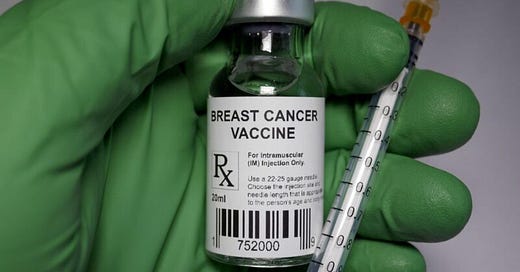Breast Cancer Vaccine
A potential breast cancer vaccine is starting human trials intended to prevent the most aggressive, hardest-to-treat, and deadliest form of the disease.
[Please note that this page contains affiliate links. If you choose to purchase after clicking a link, I may receive a commission at no extra cost to you.]
A potential breast cancer vaccine is starting human trials intended to prevent the most aggressive, hardest-to-treat, and deadliest form of the disease.
When someone has breast cancer, their doctor will test the cancer cells to see if they have any three receptor proteins.
Each of the three receptors binds with a specific protein or hormone (progesterone, estrogen, or human epidermal growth factor) to help advance cancer’s growth. Knowing which are present in the cancer cells allows doctors to figure out which therapies are appropriate.
Breast Cancer Vaccine
Approximately 15% of people with cancer have “triple-negative breast cancer,” in other words, and the cancer cells do not hold any of those three receptors, which can significantly limit treatment options.
This type of cancer will spread quickly, is difficult to detect early, and has very high recurrent rates.
Consequently, triple-negative breast cancer is the deadliest type, with about 25% of people passing away within five years of getting cancer. The standard death rate for breast cancer is 10%.
Rather than treating triple-negative breast cancer, researchers at the Cleveland Clinic have a goal to prevent it — now, after 20 years of research, they believe they may have a vaccine that works.
The target for the vaccine is a milk protein called “α-lactalbumin,” which is in cancer cells of the breast. Although, it is at extraordinarily high levels in triple-negative cells in breast cancer.
Vaccine Trials
The vaccine has already proved to prevent the growth of tumours in animal trials, and now the researchers are doing a phase 1 trial in humans.
This study consists of 24 people diagnosed with triple-negative cancer within the last three years.
The patients will be tumour-free but at a high recurrence rate because of issues like their genetics. Each volunteer will receive three vaccines at a rate of two weeks apart.
The study aims to determine the maximum dosage that is tolerable for the breast cancer vaccine and maximize the immune response. The study is supposed to end in September 2022.
The Future of the Vaccine
If the phase 1 trial goes well, the following step will be to study people who’ve never had triple-negative breast cancer that is high risk (due to genetic mutations).
Unfortunately, it could be another ten years before researchers know if the vaccine works, as scientists need to do more studies with more participants to get breast cancer to determine the vaccine’s efficacy.




